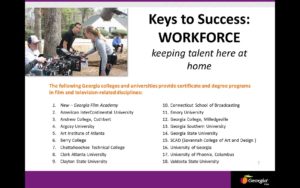
Georgia Film Industry Creates Local Business Demand
 When you see Tom Hanks portraying Sully Sullenberger in a movie this Christmas, don’t assume that most of the movie was filmed in New York City.
When you see Tom Hanks portraying Sully Sullenberger in a movie this Christmas, don’t assume that most of the movie was filmed in New York City.
In fact, much of the flight simulation and interior shooting was done in Georgia, according to Lee Cuthbert, a Location Specialist for Georgia’s Film, Music and Digital Entertainment office. Georgia’s ability to mimic other places is one of the state’s assets, said Ms. Cuthbert in a July 26, 2016 speech to the Georgia Association of Business Brokers about the economic impact of film industry on Georgia’s economy.
Georgia’s film industry is estimated to have had a $6 billion impact on the economy in 2015, based on a multiplier.
A big propellant for the film industry growth is “a very successful and somewhat generous tax incentive for film and television production in Georgia,” she said. Productions that spend at least $500,000 get a 20 percent tax credit. Productions that put the Georgia Peach logo in the credits can earn up to 30 percent. Ms. Cuthbert noted that big budget movies can have budgets approaching $200 million, so “30 percent of that means a lot to them.”
“This is not a rebate; we are not writing these folks a check. This is a tax credit and because they’re not generally Georgia corporations, or even if they are, they don’t owe that much in Georgia taxes, so they sell the tax credit to someone who owes Georgia taxes,” she said. “That’s how they monetize it.”
 Georgia businesses and individuals can buy these film tax credits for between 85 and 92 cents on the dollar, so a $10,000 tax bill can be paid off for about $9,000. “That marketplace has grown exponentially since 2008 when our incentive went into effect,” said Ms. Cuthbert. In some states like Louisiana where the incentive is a rebate, and they actually are writing a check to the production company, it can take up to two years to get that check. Ms. Cuthbert noted “these folks want to be able to get their money as quickly as possible.”
Georgia businesses and individuals can buy these film tax credits for between 85 and 92 cents on the dollar, so a $10,000 tax bill can be paid off for about $9,000. “That marketplace has grown exponentially since 2008 when our incentive went into effect,” said Ms. Cuthbert. In some states like Louisiana where the incentive is a rebate, and they actually are writing a check to the production company, it can take up to two years to get that check. Ms. Cuthbert noted “these folks want to be able to get their money as quickly as possible.”
Many brokers deal in film tax credits and conservation tax credits in Georgia, and Ms. Cuthbert offered to provide anyone with that list. Georgia Film Office contacts.
Georgia’s vast array of locations, from beaches to mountains to small towns and big cities, is also attractive to film companies. “We have everything in Georgia but a desert,” Ms. Cuthbert quipped. Georgia has stood in for Florida in productions of Baywatch and Magic Mike XXL, in part because Florida discontinued their film incentive.
“So much of what they do now involves adding a green screen and bringing in other elements like the Brooklyn Bridge or something like that,” Ms. Cuthbert said. “They aren’t as particular about the look necessarily of our downtown.”
Georgia also has an extensive roster of skilled workers for the film industry. In 2011, the Motion Picture Association of America estimated that there are 80,000 jobs tied to the industry in Georgia, and “we think it’s significantly more than that,” she said.
 Many Georgia colleges and universities have film and television programs at the undergraduate and master’s level. In 2016, the Georgia Film Academy opened as a joint venture between the technical college system in Georgia and the university system in Georgia. The academy is teaching people technical positions for film and television crews.
Many Georgia colleges and universities have film and television programs at the undergraduate and master’s level. In 2016, the Georgia Film Academy opened as a joint venture between the technical college system in Georgia and the university system in Georgia. The academy is teaching people technical positions for film and television crews.
“So one of the things we’re really invested in doing is training these folks and then keeping them here working in Georgia and paying Georgia taxes. They’ve always had to go to the coasts before, New York or California, to find jobs. That’s rapidly changing here,” Ms. Cuthbert said.

Lee Cuthbert – Location Specialist, Entertainment
The infrastructure surrounding the film industry has also grown, and Ms. Cuthbert noted that “those are Georgian corporations paying their full share of Georgia taxes and employing Georgians who pay their full share of Georgia taxes. They do not receive the incentive but they’re here working supporting these film and television projects that we do give the incentive to, and it’s very diverse.”
Among the categories of businesses involved in film include cameras, props, costumes, fabrics, military surplus, and period military gear suppliers. One very specialized trade is foam fabricators.
“If you’re looking at a set and you see boulders or you see pieces of a glacier or something like that, even wreckage of a building, it’s probably sculpted in foam,” said Ms. Cuthbert. “Those people are very skilled, and it’s a very specialized training. And we’ve had some of these businesses here for years.”
Georgia’s professional stage capacity has grown. After the Walking Dead snapped up a stage near Senoia in 2008, an economic downturn motivated some other businesses to convert some big box and warehouse space into stages.
“Companies came in and would put up their own lighting structure–they call it a grid–and run their own air conditioning from trailers outside and make these things defacto stages,” she said. “In the interim the stage infrastructure environment has grown very extensively here.”
Pinewood, the English company that produces the Bond, Star Wars and Harry Potter films, built a facility in Georgia which now has 15 stages, and eventually plans to have 31.
Georgia’s amenities are also attractive to the film industry. “You know these guys come in, they take their whole department out to see a Braves game or a Hawks game, and they’re always asking for tickets and affordable housing.” Hotels, shopping and a lively art scene are also important. Georgia’s temperate climate is also a draw. “It’s hot but you can shoot all year long.”
Hartsfield Jackson International Airport is “very, very important.” “They do not have to change planes to get to Georgia as opposed to going to work in Louisiana or North Carolina,” she said. “These are not folks who love changing planes, honestly, and there are 26 nonstop flights a day to and from L.A. to Atlanta.” Virgin American Airlines established two routes from California to Atlanta specifically at the request of folks in the film and television production industry.
The economic impact — $6 billion in 2015 – includes crews coming in and spending money, “tipping waiters and waitresses, dry cleaning and shredding services, pet sitting, massage therapy,” she said. “That dollar in the film industry has a very wide ripple. So chances are a lot of businesses that you work with have been impacted by this industry whether or not you are dealing with them directly.”
Georgia’s Camera Ready progra m places a certified a film friendly liaison in all of the state’s 159n counties, and is the only film office in the country with a program like this.
m places a certified a film friendly liaison in all of the state’s 159n counties, and is the only film office in the country with a program like this.
“We have somebody who’s our boots on the ground expert that we or a production company or a location manager can pick up and call and say “give us a hotel,” or “can you find us a courthouse” or anything that we may not know about some counties out in the state. They can go on our web site click a county and find the name of the film friendly liaison and find a little bit of information about that that area as well,” Ms. Cuthbert said.
Most of Georgia’s film industry stays within a 30 to 40 mile radius of Atlanta or Savannah, largely because of union rules and the added expense of transportation and housing of crew outside that zone. Ms. Cuthbert’s office is working to try to get productions to work outside of that area.
Film tourism is another business that benefits from the industry. The Tour Georgia Film website includes information on Georgia films coming out; information on how to be an extra; autographed items; and a map of film locations so fans can take their own tour. The film tourism industry also extends years beyond the production, Ms. Cuthbert said. Although the Dukes of Hazzard filmed five episodes in Georgia five, when they had a 2013 reunion, they drew 10,000 people.
People are still wandering Savannah’s squares looking for Forrest Gump’s bench, eating in Juliette, Ga., featured in Fried Green Tomatoes. Covington brags that it’s the Hollywood of the South because its historic town square has been used for productions of “I’ll Fly Away,” “In the Heat of the Night,” and the “Dukes of Hazzard.”
Citizens wanting to promote their communities as film destinations can investigate the location database and contact a Camera Ready contact to help promote. Citizens can also add their own homes or other properties to a database of sites available for film productions.
“If you’re a vendor who wants to market to the film industry or if you’re a crew member who wants to work in the film industry you can list in our real crew production directory free of charge,” Ms. Cuthbert said.
